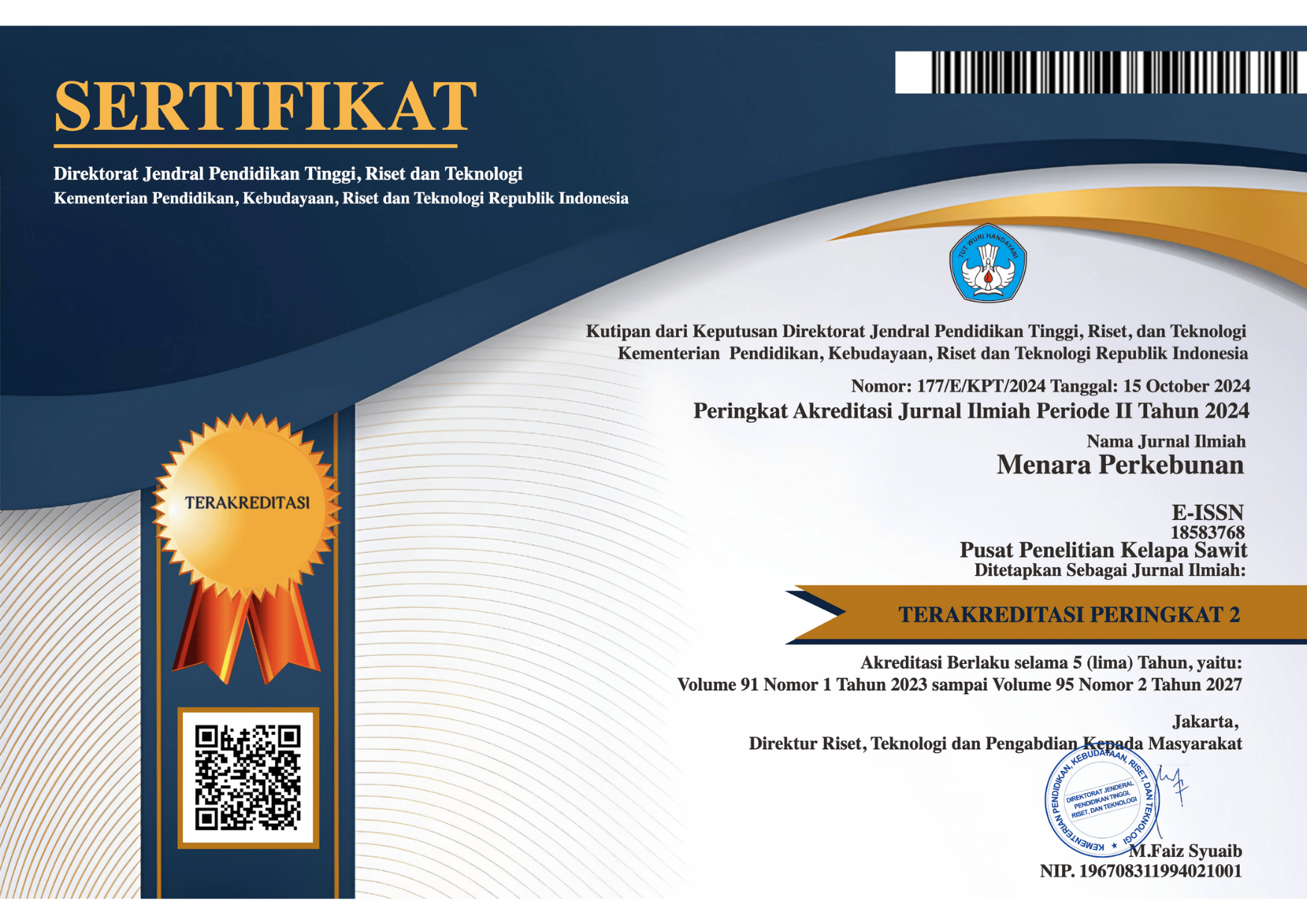Isolasi fragmen gen LIPASE dari kapang Absidia corymbifera, Rhizopus oryzae dan Rhizopus oligosporus Isolation of LIPASE gene fragment from Absidia corymbifera, Rhizopus oryzae and Rhizopus oligosporus fungi
DOI:
https://doi.org/10.22302/iribb.jur.mp.v77i1.112Keywords:
Rhizopus niveus, lipase, genetic engineering, RT-PCR, indigenous fungAbstract
Abstract
Diversification of oil palm products, such
as healthy oil, needs lipase sustainability as a
biocatalist. Many attempts have been
developed to produce lipase, including
intensive exploration and screening of several
species of molds. Genetic engineering for over
expression of LIPASE gene in the selected
mold is considered to be the potential
approach for efficient production of this
enzyme. This research was aimed to isolate the
LIPASE gene fragment of Indonesian
indigenous fungi, namely Absidia corymbifera,
Rhizopus oryzae and R. oligosporus by means
of RT-PCR (Reverse Transcriptase Polymerase
Chain Reaction) technique using heterologous
primers. The result showed that a cDNA
fragment of 462 bp has been amplified and
isolated from the three fungi with different
concentration. The highest quantity was found
from A. corymbifera. The RT-PCR products
isolated from A. corymbifera was cloned,
sequenced and analyzed for its homology to the
sequence of LIPASE gene from other species.
BLAST analysis showed that the DNA sequence
of the cloned RT-PCR product derived from
A. corymbifera was highly homologous with
LIPASE gene from Rhizopus niveus.
Abstraks
Diversifikasi produk kelapa sawit, seperti
minyak sehat (healthy oil) memerlukan
ketersediaan lipase sebagai biokatalis. Berbagai
upaya untuk produksi lipase telah dikembang-
kan, termasuk eksplorasi dan skrining terhadap
beberapa spesies kapang secara intensif.
Rekayasa genetika untuk mengoverekspresi-
kan gen LIPASE pada kapang hasil skrining
tersebut dipandang merupakan satu pendekatan
potensial untuk produksi enzim ini secara
efisien. Penelitian ini bertujuan untuk
mengisolasi fragmen gen LIPASE dari tiga
kapang indigenous Indonesia, yaitu
A. corymbifera, R. oryzae dan R. oligosporus,
menggunakan teknik RT-PCR (Reverse
Transcriptase Polymerase Chain Reaction).
Hasil penelitian menunjukkan bahwa fragmen
cDNA sepanjang 462 bp dari ketiga kapang
telah diisolasi, masing-masing dengan
kuantitas yang berbeda. Hasil tertinggi
diperoleh dari kapang A. corymbifera. Produk
RT-PCR dari A. corymbifera diklon, disekuen
kemudian dianalisis homologinya dengan
sekuen gen LIPASE dari spesies lain. Analisis
BLAST menunjukkan bahwa sekuen DNA dari
produk RT-PCR terklon yang berasal dari
A. corymbifera memiliki homologi tinggi
dengan gen LIPASE dari Rhizopus niveus.
Downloads
Downloads
Submitted
Accepted
Published
How to Cite
Issue
Section
License
Authors retain copyright and grant the journal right of first publication with the work simultaneously licensed under a Creative Commons Attribution License that allows others to share the work with an acknowledgement of the work's authorship and initial publication in this journal.













